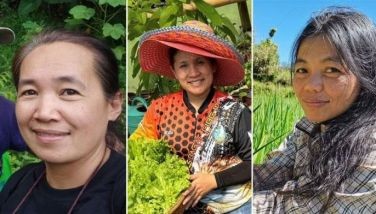Again, Cha-cha

Oh well, there goes economic Cha-cha.
As soon as Speaker Martin Romualdez announced a revival of economic Charter change in 2024, the head of the Senate panel on constitutional amendments, on cue, resurrected his own Cha-cha advocacy: term extensions for the president, vice president and all lawmakers, with more senators to be added to taxpayers’ already bloated payroll.
Maybe Sen. Robinhood Padilla simply wants to make Cha-cha palatable to his colleagues in the Senate, who have long been cool to the idea, and to President Marcos.
A day before Padilla opened his mouth, the ate ng Pangulo, Sen. Imee Marcos, had summed up a common reaction (not only in the Senate) to the latest push for economic Charter change: Ang kulit!
Her brother the President, Senator Imee pointed out, had already said amending the Constitution is not a priority at this time, when his administration consistently gets the lowest marks in fighting inflation.
Senator Imee counted two times that the Senate has rejected Charter change proposals from the House of Representatives. Most senators have been consistently leery of Cha-cha, brushing aside congressmen’s promise that constitutional amendments would be limited to economic provisions. Padilla has validated this concern.
The Charter can in fact use revisions of restrictive provisions that deter investments. Written in 1986 and ratified in 1987, there are provisions that can use a fresh take attuned to the cyber age.
Unfortunately for its proponents, there has always been deep distrust of Cha-cha initiatives emanating from the House. This is mainly because its members seem to have an uncontrollable urge to make last-minute self-serving insertions in their work.
* * *
Once a supposedly economic Cha-cha gets going, there’s no way to prevent proponents from expanding it to political changes and a full rewrite of the Constitution. Even businessmen who think economic Cha-cha can be useful believe the risks of political unrest trump potential advantages and can destabilize the economy.
The businessmen think it’s better to simply go around the economic restrictions – which is what has been done in certain areas such as mining and ownership of land for various purposes.
Because the makulit in this case is Senator Imee’s cousin the Speaker, who is widely believed to be eyeing the presidency, the nasty coffee shop talk is that the ruling clan wants a constitutional path to staying in power for life, through a shift in the form of government.
The scenario, according to the coffee shop buzz, is that Cha-cha will pave the way for a shift to a French-style parliamentary system, under which Romualdez can sit as president while cousin BBM can be the prime minister.
Of course Romualdez must win the presidency first. Since last year, his political nemesis and likely strongest rival has been alerting the nation about his perceived political ambitions, and apparently moving to derail it.
Several other senators have raised the same main issue in their coolness to Cha-cha: a shift to a parliamentary system can abolish the Senate.
Cha-cha in 2024 could be initiated. Whether it will go beyond a draft of the amended (or fully rewritten) Constitution, however, could be in the realm of the P20-a-kilo rice hallucination.
* * *
Foreign land ownership restrictions have often been cited for economic Cha-cha. Yet two of the top destinations for foreign direct investment don’t allow foreign ownership of land.
Communist China, where all land belongs to the state, grants foreigners only land use rights ranging from 40 to 70 years. Land use rights in rural areas can be expropriated in the name of public interest as defined by the state. In urban areas, the expropriation can be done to renovate old towns.
Vietnam, where all land also belongs to the state, also grants land use rights to foreign investors. Foreigners can own houses or apartments for up to 50 years.
Because of rising production costs and (for certain countries) geopolitical tensions with Beijing, foreign investors have been decamping from China and finding new sites for their operations.
In Southeast Asia, Vietnam is the destination of choice. An official of one of the G-20 economies told me recently that there are about 6,000 enterprises owned by his compatriots now operating in Vietnam, compared to just 300 in the Philippines.
* * *
Now that I’ve resumed in-person meetings and attendance at large gatherings, I’ve found it disappointing that problems raised by both foreign and local investors since pre-pandemic days have remained unchanged.
The main problem mentioned by investors in the Philippines is still ease of doing business – despite the passage of two laws against red tape and promoting ease of doing business, and setting up of supposedly one-stop shops.
Not even the threat of execution during the Duterte administration could significantly reduce red tape. From top to bottom, from national to local governments all the way down to the barangay, there’s still a mountain of red tape, with the person in charge at every step concerned about only one thing: what’s in it for me?
One of the country’s wealthiest businessmen told me that simply obtaining local health clearances is a hurdle.
Regulatory uncertainty, judicial inefficiency, rent seeking, crony capitalism at the national and local levels, endemic corruption in all branches of government, apart from inadequate infrastructure – these are long-running problems that won’t be solved by amending the Constitution.
Even the much touted Maharlika Investment Fund has stoked concerns that money that is supposed to finance loans to farmers and micro enterprises will end up supporting crony capitalism, Marcos 2.0 version.
The latest data for foreign direct investment inflows showed that last September, net FDI plummeted to $422 million – its lowest level in 41 months, or since April 2020 when the figure stood at $314 million amid the COVID lockdowns.
The $422 million is a fall of 42.2 percent from the $731 million recorded in September 2022, and 46.58 percent lower than the $790 million posted in August this year, according to the data released by the Bangko Sentral ng Pilipinas.
The BSP cited “persistent global economic uncertainties” for the slowdown in net FDI inflows by 15.9 percent in the first three quarters of 2023, to $5.9 billion from the $7 billion during the same period last year.
Uncertainties arising from Cha-cha could make the situation worse.
- Latest
- Trending























